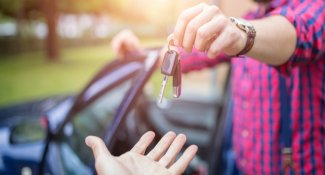Curbstoning is an illegal scheme in which people draw car shoppers to places such as the side of the road (curbside) or a vacant lot and sell them unfit used cars. A curbstoner poses as a vehicle's owner to avoid both city and state permits or licensing requirements. These licenses are put in place to protect consumers and are imposed on legitimate authorized automotive dealers for the sale of a vehicle.
Avoid curbstoning by learning more about how this scheme is played and following the steps outlined below.
Why Is it Called Curbstoning?
Curbstoners sell cars without permits, a dealer's license, or a regular place of business. To make their illegal transactions look like private sales, unscrupulous auto dealers may offer their used vehicles from a parking lot, curb, or in front of a residence, so the practice is called curbstoning.
Car dealers who engage in curbstoning are neglecting the buyer's right to take advantage of consumer protections such as federal warranties and state lemon laws. Curbstoners sell damaged and salvaged used cars to buyers and vanish. Consumers who purchase vehicles from curbstoners do not have any seller contact information, leaving them stuck with worthless or dangerous cars and problems.
Problems With Buying Used Motor Vehicles from Curbstoners
Curbstoners buy vehicles cheap from salvage yards, at auctions, and private sellers. These motor vehicles may be junked SUVs, wrecked trucks, or flooded used cars. The vehicles are not fit for sale on the open market, and the unlicensed dealers selling them do little to no mechanical repairs or safety checks.
After some cosmetic work, these used cars that are unsafe to drive end up on eBay, Craigslist, on pop-up lots, or by the side of the road with a "For Sale" sign. An example of a curbstone purchase occurred recently in California when authorities confiscated a curbstoned SUV sold with misaligned doors, unsafe frame welding, and without airbags.
When you do not buy from a reputable dealer, you risk purchasing a used car with the odometer rolled back, undisclosed frame damage, a salvage title, or mechanics' or promissory liens. Illegal used car sales put you and the general public at risk by placing dangerous motor vehicles on your local streets and roads. Curbstoners deprive honest licensed dealers of sales revenue and governments of taxes for public use.
Red Flags That May Reveal Curbstoning
Industry experts say curbstoners are responsible for a high number of online classified ads for used cars. Curbstoners can flip several motor vehicles in a few weeks of illegal sales which is why curbstoning is a prominent issue.
Before making an offer on a used vehicle, look for red flags that the seller is a curbstoner. If used vehicles appear suddenly in places they were not before, such as parking lots or by the side of the road, this could be a big red flag of curbstoned vehicle sales happening in your area.
When there is a phone number or contact information provided on a "For Sale" sign, beware of matching information with other used cars for sale in the area. Multiple used vehicles for sale without proper documentation is a red flag and can be questioned as curbstoning.
Popular used car selling sites that offer free advertising, including Craigslist, may reveal the same phone number for several private party sellers; if they do, steer clear of these transactions as they are most likely curbstoning schemes.
Questions to Ask About a Used Vehicle
A great way to check whether a phone number is tied to a curbstoning scheme is to call the number and ask for details about "the car for sale," and see if the seller says, "which car?" This is a clue that multiple used cars are linked to that number and the so-called private party might be a curbstoning scammer.
Before you take the time to inspect a used vehicle in person, ask the seller specific questions about the vehicle's history over the phone. Find out how long the seller has owned the car and why they are selling it. Ask whether they have the vehicle's maintenance records and whether it has been in an accident.
You want to know whether the seller has the vehicle’s title and if their name is on it. If not, ask who holds the title and why. You want to verify a relationship with the vehicle's actual owner so that you may obtain the car's title legally if you purchase it.
Things Curbstoners Won't Let You Do
Reputable car dealers have offices and keep records to meet government requirements. These auto dealers sell vehicles by using practices that provide consumer protection. Curbstoners do not work that way. Watch out for typical curbstoner behavior, such as refusing to accept your check or money order. By insisting you pay cash, the curbstoner generates less of a paper trail for the transaction and they can avoid paying sales and income tax.
In an illegal car sale, curbstoners will not give you maintenance records that match the car you are looking to purchase. Curbstoners will also refuse to let you get an independent mechanical inspection. This lack of corporation on the seller's part could later reveal dangerous damage, shoddy repair work, or failure to repair the vehicle.
People who sell vehicles from salvage illegally may not let you obtain a Carfax report because vehicle history reports will show that the vehicle was purchased from a salvage auction sale. If a seller does not allow you to view the title, or you can not verify that the seller's name on their driver's license matches the name on the title of the vehicle, you might be involved in a curbstoning scam.
What to do if you have been Curbstoned
If you think you have become a victim of curbstoning or you believe an auto dealer is pretending to be a private party seller to avoid their legal obligations, seek legal advice from an attorney as soon as you can. You may be successful in filing a civil claim against the seller or car dealership and may be able to recover any money you lost.
Report the facts of your transaction to your local law enforcement department or the Department of Motor Vehicles (DMV), as they may want to investigate possible criminal charges. Reporting a curbstoning scheme also helps protect other car buyers from making the same mistake.
Finding the Right Vehicle
Curbstoning can happen to you, but do not let the prospect of being scammed deter you from your car buying efforts. When you are looking to purchase a used car, search for a legitimate advertisement, whether it be online or in person. There are plenty of legitimate private party sellers who are willing to negotiate their price so that you end up with a solid deal.
Make sure to thoroughly research the make and model you are wanting to purchase so that you known what to look for when you see the vehicle in person. Read owner reviews and call your insurance company to see how much it would cost to insure the vehicle every month.
Run a vehicle history report of your desired vehicle utilizing the car's vehicle identification number (VIN). A vehicle history report will alert you of any accidents, floods, or any other circumstances that would discourage you from the purchase of that particular vehicle. Take a test drive and hire a certified mechanic to do an independent purchase inspection.
If everything checks out, make your best deal, write the check, and drive away happy.


